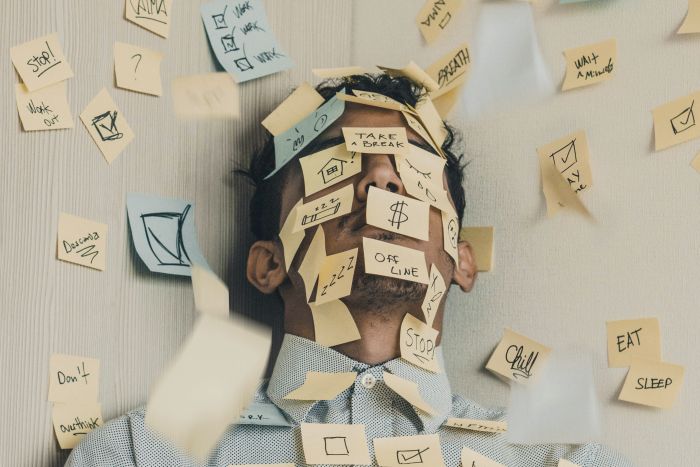Here we discuss strategies for managing ongoing stress to help with the everyday ebbs and flows that we all experience.
Here are some suggestions:
Coping Strategies for Managing Ongoing Stress
Visualisation
There are excellent YouTube videos of visualisation tools you can use while sitting at your desk. Many are only minutes long, yet even in that short amount of time you can feel the difference.
Regular Exercise
Exercise is one of the most powerful things we can do for our minds and bodies. Exercise is a natural outlet for all of the hormones released when we feel stressed. The stress your body feels from exercising allows it to recover more quickly from other stresses in your life.
If you haven’t exercised for a while, or you have injuries or health conditions that may affect your ability to exercise, then of course speak to your GP first.
It’s okay to start slow and work your way up to something more rigorous. It’s best not to start with a 5km run if you’ve never run before – you risk injuring yourself or making it so hard that you won’t stick to it. Doing something and getting started is important, but you don’t have to set yourself up for failure by trying to do too much at first.
Yoga
This is an extremely powerful tool for many people and excellent for managing ongoing stress. Focussing on the connection between mind and body as well as experiencing the slower pace of yoga can be an excellent stress reducer.
Meditation
This can be done anytime or anywhere. Brain science is beginning to show us that meditation is one of the best things you can do for your mental health and wellbeing!
There are some people who relish longer meditations – meditating for twenty minute sessions or more every day. However, you don’t have to do that if you prefer to do smaller meditations.
Sit for a few minutes and let your mind wander naturally; take a deep breath and sigh out when moving from one activity to the next; use deep and deliberate breathing every time you get a red light while driving your car; or use the time in an elevator to be still and focus on the buttons lighting up as the elevator moves through the floors, not engaging with any thoughts that may be wafting through your mind.
The key is to develop your capacity to be still, to be mindful and not be dragged mentally through the day. Instead choose where you put your attention and give your brain some attention breaks. Many people benefit from this – it’s not just for hippies! I once heard meditation compared to cranial floss. It’s as good at cleaning out the mess in your brain as dental floss is at preventing cavity and decay for your teeth.
Try these guided meditation recordings.
Sleep Hygiene
Sleep is critical and yet many of us cannot sleep properly when we are stressed out, which leads to further stress and anxiety. Making sure that you go to bed at the same time every night, and do not take your phone/computer/ipad/TV to the bedroom with you. Give yourself an electronic diet and train your brain to recognise when it is time to sleep.
This is critical for maintaining your health and wellbeing. If you live by the adage that you can sleep when you are dead, you may get that opportunity quicker than you like!
Nutrition
Paying attention to what we eat and when we eat is very important. Sometimes when we feel stressed, our bodies are in crisis and crave sugar and we then have a tendency to inhale high fat, high sugar carbohydrates. The catch is when you feel terrible you eat terrible – and when you eat terrible, you feel terrible and it can be a vicious cycle.
It is important to plan for those times when you may be too stressed or busy to eat healthily. Have some prepared meals or leftovers in the freezer, and travel with healthy snacks on hand (such as nuts, fruit, yoghurt etc.) to avoid being tempted to the dark side!
Here are some tips for organising a healthy lunch.
Substance Use Management
Pay attention to this. We know that drugs and alcohol are not good for you. Alcohol in particular is a triple threat: it is a mood enhancer, a depressant, and a disinhibitor. You might say or do things that you later regret. If you are concerned that your use may be getting a bit out of control, go and speak to your GP and have a chat about your options.
Read more about substance use.
Books and Websites
There are many books and websites offering help and advice, but not all are good. There is substantial evidence to indicate that people can achieve similar levels of benefit from using a good therapeutic book or website, as from actually sitting face-to-face with a therapist.
Read more about the value of books.
Thinking and Reality Checking
Are you catastrophising or over-reacting and making a mountain out of a molehill? Do you have black and white thinking?
When we react with intensity our thinking is often being clouded by a thought distortion. Stopping to look for other perspectives and to view the reality of the situation can be very helpful in aiding us to remain calm and respond rationally.
Boundaries Boundaries Boundaries
If we feel as if we are being taken advantage of, or being treated badly, it can affect our willingness and capacity to deal with little everyday issues. It can also affect our overall sense of confidence and belonging.
Sometimes this can be difficult and we may not pay attention to our boundaries, until someone has hopped our fence and is stepping all over us. Have a think and try to figure out what behaviours you will and will not accept from others, and put in place some strategies to deal with this proactively.
Shake-Off-Your-Day Strategies
Shake-off-the-day routines help to separate work from home (whichever one is the major stress creator for you). It could be that you are thinking of work late into the night, or that your home life issues dominate your thinking when you are at work.
Which of these is most likely to be the case for you? What can you do about it? How can you strive to be more mindfully present with what you are currently engaged in, rather than preoccupied with rehashing the past, or rehearsing the future?
Some solutions could be: write a to-do list for tomorrow before you leave work at the end of the day, thereby leaving your tasks behind; stop at the park and go for a walk or jog on your way home; listen to loud funky music in your car; water the plants and tell them all of the things that are still stuck in your head about work; have a shower and change out of your work clothes, etc.
If you find it difficult to switch off, putting in place a routine such as this may help you to delineate the line between your work and home life.
Managing Ongoing Stress
Give one of these strategies a try – it just might work for you! Let us know how you go, and if you have any other suggestions that work well, please drop us an email – if it works for you, it may help someone else!
You may also be interested in this article: STRESS: The Difference Between Eustress and Distress
-
 Healthy Minds, Flourishing Workplaces | eLearning Course$198.00 inc.GST
Healthy Minds, Flourishing Workplaces | eLearning Course$198.00 inc.GST -
 Taming Your Scaredy Cat: Learning to Live with Anxiety$24.00 inc.GST
Taming Your Scaredy Cat: Learning to Live with Anxiety$24.00 inc.GST -
 Building Buoyancy | eLearning Course*$180.00 inc.GST
Building Buoyancy | eLearning Course*$180.00 inc.GST
Tap into our mental health expertise
Image: Luis Villasmil (Unsplash)



